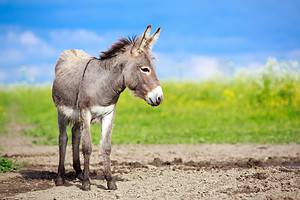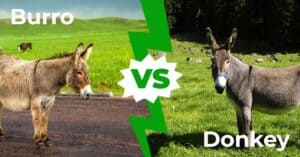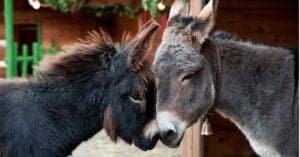From Eeyore in Winnie-the-Pooh to Donkey in Shrek, donkeys are portrayed as wise and witty characters with good reason: donkeys are inherently intelligent creatures. Their capacity for memory, problem-solving, and adaptability underpins their portrayal as clever and thoughtful animals. Eeyore’s reflective musings and Donkey’s quick-witted humor pay homage to the species’ ability to engage in nuanced social interactions, make calculated decisions, and exhibit a sensitivity that showcases their cognitive prowess. So, how smart are donkeys? Continue reading to learn everything we know about their intelligence.
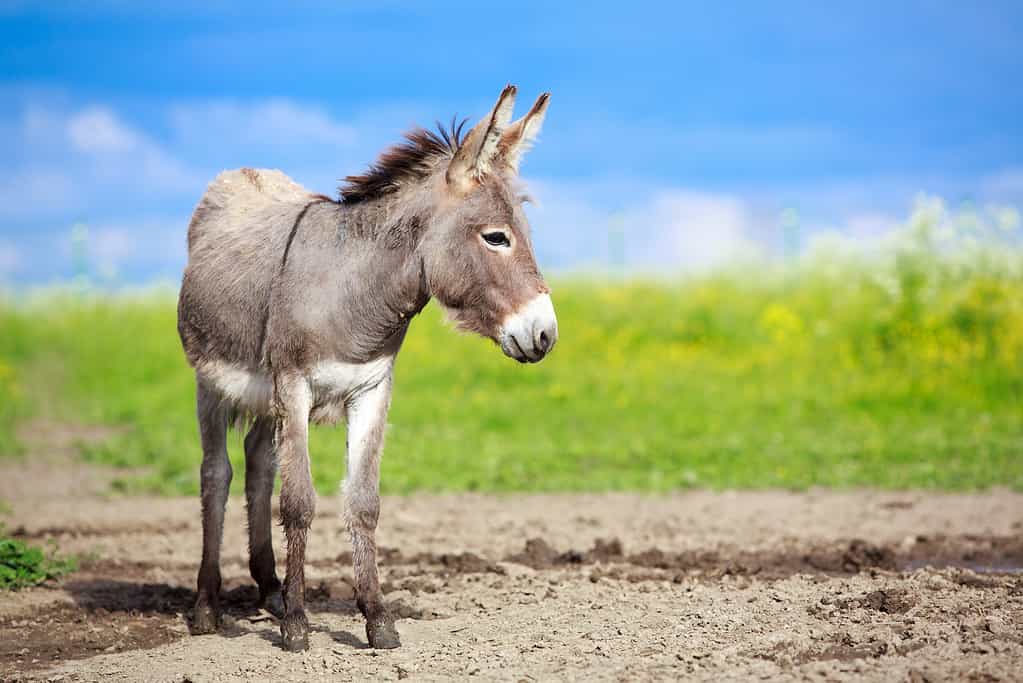
Donkeys are inherently intelligent creatures.
©DragoNika/Shutterstock.com
How Smart Are Donkeys? Everything We Know About Their Intelligence: Memory
Donkeys (Equus Asinus) are considered to be intelligent animals. Donkeys are known for their amazing memories. They are able to remember people, places, and situations. This ability to remember helps them navigate their environment and form relationships. Their ability to recall, recognize, and remember people and events is also important in donkeys’ ability to learn and adapt. Donkeys easily learn and adapt to new tasks, routines, and commands. They perform tasks such as carrying loads and pulling carts while participating in agricultural work and mining operations. Donkeys have been trained to navigate through dark mines and have proven invaluable during rescue operations.

Donkeys easily learn and adapt to new tasks, routines, and commands.
©diy13/Shutterstock.com
How Smart Are Donkeys? Everything We Know About Their Intelligence: Problem-Solving
Donkeys have been observed exhibiting problem-solving skills when faced with challenges, showcasing their ability to adapt and find solutions. They can figure out how to access food, water, or shelter, even in unfamiliar settings. While they may not approach problem-solving in the same way humans do, their behavior indicates a level of intelligence and resourcefulness. These Intelligent creatures have shown creativity in accessing basic needs. Using their hooves to kick open gates or containers, and manipulating objects to reach nourishment or a drink of water are some of the ways donkeys have illustrated their problem-solving abilities. Donkeys in unfamiliar environments, such as new pastures or trails, have been observed using trial and error to find the best paths. They assess the terrain, test different routes, and ultimately choose the safest and most efficient path to reach their destination.
How Smart Are Donkeys? Everything We Know About Their Intelligence: Sensitivity
Donkeys are sensitive animals and can sense danger or changes in their surroundings. This sensitivity contributes to their ability to adapt to different situations. Donkeys are known for their cautious nature. While some might interpret this as stubbornness, it can also be seen as a sign of their intelligence, as they tend to assess situations before acting. Donkeys’ heightened sensitivity to danger, such as the presence of toxic gases or instability in the mine, made them useful as early warning systems. They would show signs of distress or discomfort before humans were aware of potential hazards. In the wild donkeys demonstrate a heightened awareness of potential threats. They use their problem-solving abilities to escape from predators or dangerous situations by finding exits or hiding spots.
How Smart Are Donkeys? Everything We Know About Their Intelligence: Social Acumen
Donkeys are social animals and can form strong bonds with other donkeys and even with humans. They can recognize different individuals and show emotional responses to them. Donkeys use a variety of vocalizations, body language, and facial expressions to communicate with each other and with humans. They can convey information about their emotions, intentions, and needs. Donkeys can learn to understand and respond to human cues and commands. This ability to communicate with humans shows their capacity for problem-solving through social interactions.
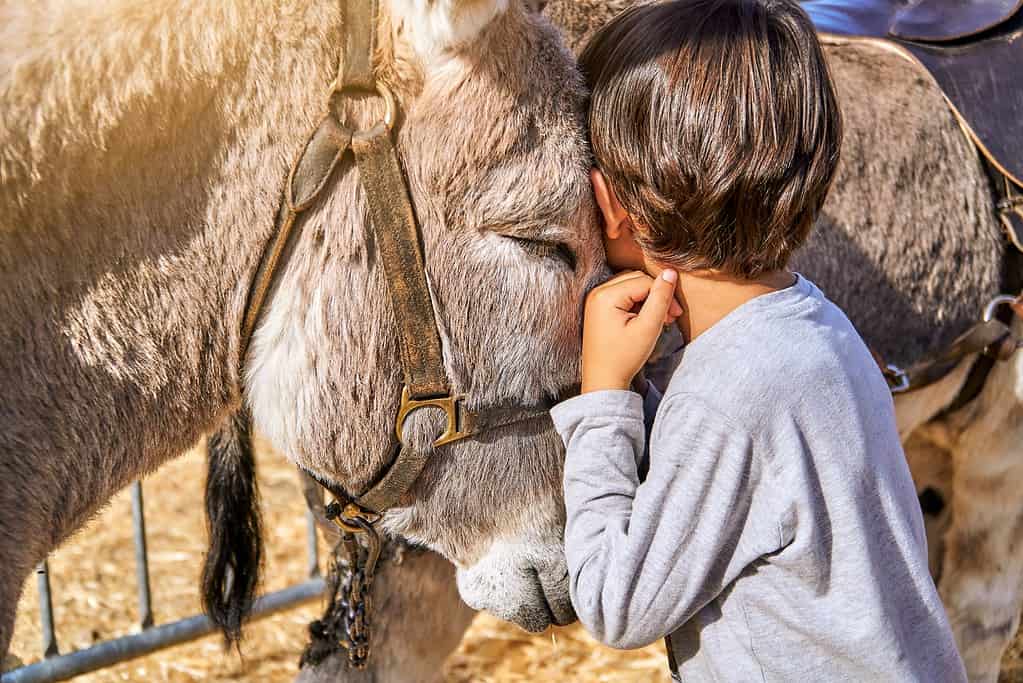
Donkeys are social animals and can form strong bonds with other donkeys and even with humans.
©Komuso and Colorsandia/Shutterstock.com
Can Donkeys Count?
There isn’t substantial evidence to suggest that donkeys possess advanced numerical abilities like counting in the same way humans do. However, donkeys have some level of numerical perception. They can distinguish between quantities and may be able to recognize differences in group sizes.
Donkeys have been trained to respond to cues associated with specific quantities, such as being given a certain number of treats or following commands related to a number of actions. This suggests that they can associate cues with quantities, but their ability to perform complex arithmetic or understand abstract numerical concepts is limited.
Donkeys, Burros, and Mules
Donkeys, burros, and mules are distinct equine types. Donkeys and burros are both Equus asinus. They are the same breed. Donkeys and burros are characterized by their stocky build and braying vocalization. Burro is a term often used in the Southwestern U.S. Burro is both the Spanish and Portuguese word for donkey. Mules, in contrast, result from crossbreeding a male donkey (Equus asinus) and a female horse (Equus ferus). Their offspring inherit traits from both parent species. Mules possess the strength of a horse and the hardiness of a donkey. Donkeys, burros, and mules are all considered intelligent.
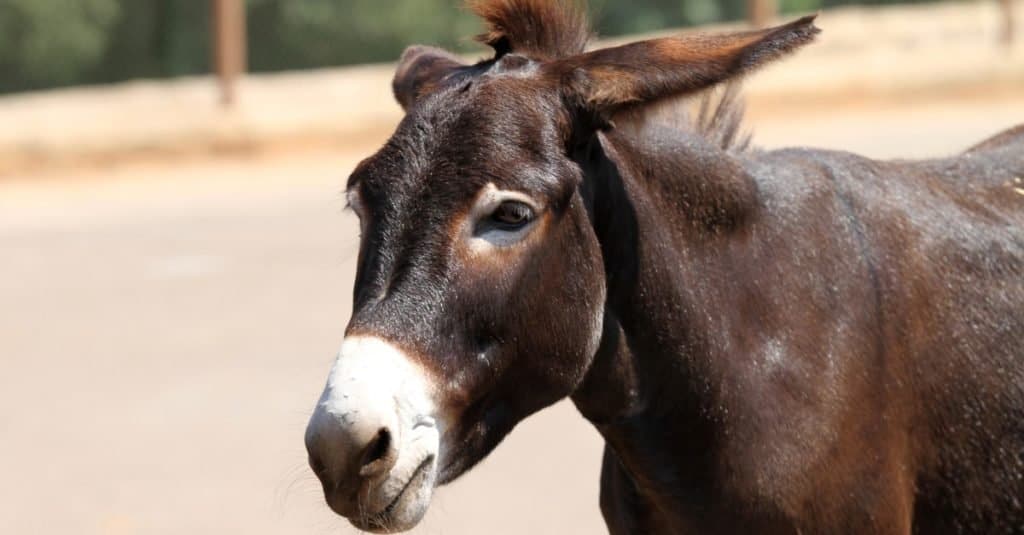
Mules (pictured) result from crossbreeding a male donkey (
Equus asinus) and a female horse (
Equus ferus).
©BlackDorianstock/Shutterstock.com
Five Fun Facts about Donkeys
- Donkeys have long lives. They typically live 25-30 years. Some exceptions are Bubble of Warwickshire, U.K., who lived to be 64 years old; Suzy, of New Mexico who lived for 54 years and Bam Bam of Australia who was 51.
- Each donkey has its own unique bray, allowing them to recognize each other.
- Benjamin, the donkey in George Orwell’s Animal Farm is portrayed as wise, skeptical, and observant.
- A blind donkey will often bond with a seeing donkey who will act as its guide.
- Though typically characterized as stubborn, Donkeys are not stubborn. They can, however, be reluctant to do anything that they deem unsafe.
The photo featured at the top of this post is © vvvita/Shutterstock.com
Thank you for reading! Have some feedback for us? Contact the AZ Animals editorial team.



